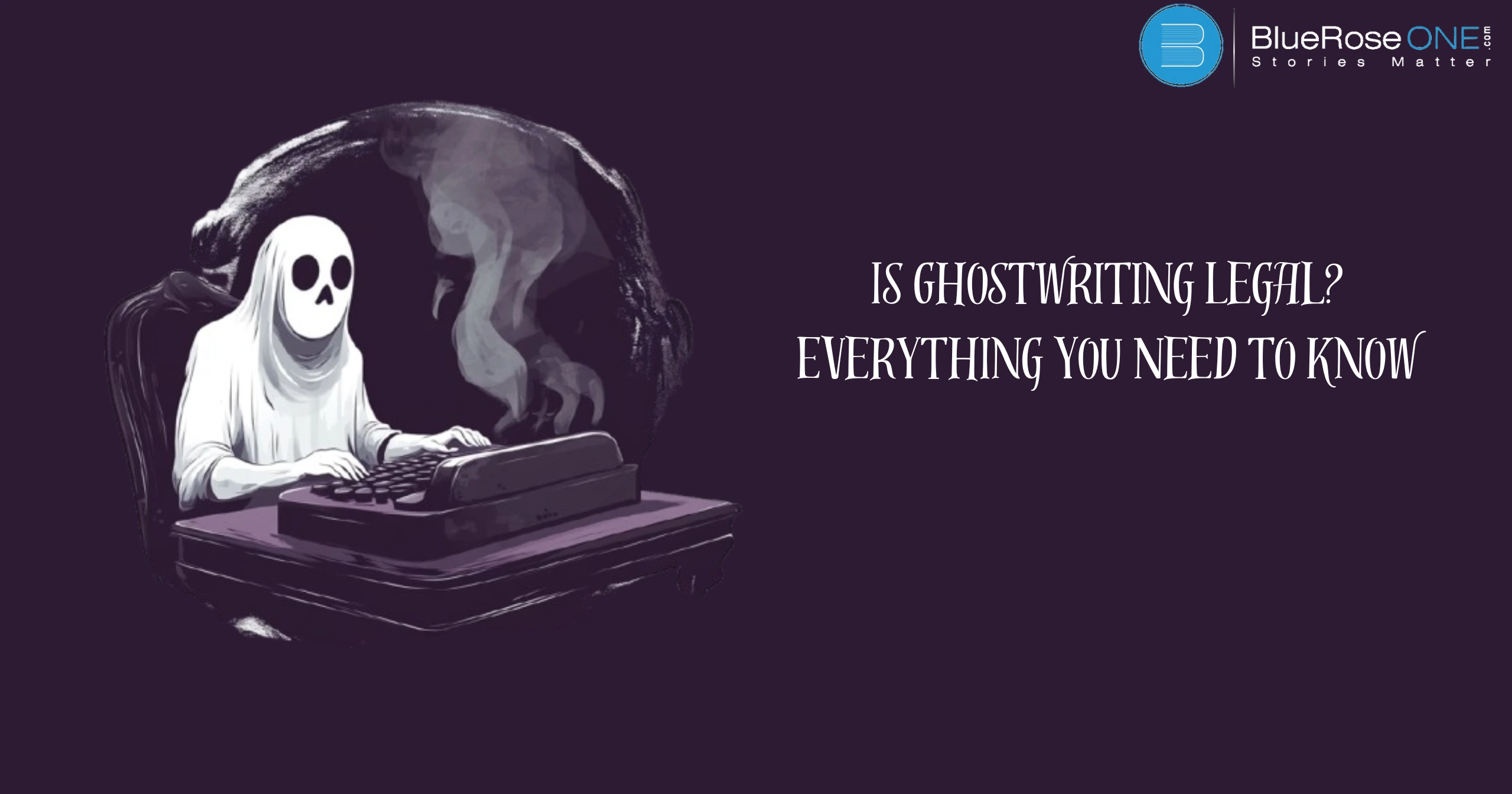The practice of ghostwriting is becoming more and more common in many sectors. Ghostwriters are indispensable behind the scenes, producing anything from political speeches to best-selling books. However, one query comes up frequently: Is ghostwriting allowed? This essay covers all the ground you need to know about the ethics and legality of ghostwriting, enabling you to comprehend the legal position taken by the government about this fascinating profession.
What is Ghostwriting?
Ghostwriting is the process of creating content for someone else to publish under their own name, such as a book, article, speech, or piece of music. While the ghost writer writes the content, credit is usually given to another person, usually a public personality or professional who needs the information but has the time or writing skills to create it.
How Ghostwriting Works
A typical ghostwriting agreement involves the ghostwriter collaborating closely with the author-to-be. The ghostwriter might work with the client’s rough manuscript, conduct interviews, or receive comprehensive instructions or outlines. After the job is finished, the ghost writer transfers the rights to the customer, who then publishes it under their own name without giving the ghostwriter any acknowledgement.
You may also read: List of 10 Best Libraries in Visakhapatnam for Bookworms
Popular Forms of Ghostwriting
Ghostwriting isn’t limited to one specific industry. You can find ghostwriters working on:
- Books (especially autobiographies)
- Speeches (for political leaders and executives)
- Blog posts and articles
- Music lyrics and compositions
Is Ghostwriting Legal?
Legal Definition of Ghostwriting
The employment of a writer to create text that is attributed to another person is the legal definition of ghostwriting. In general, ghostwriting is acceptable as long as both sides are in agreement on the conditions of the agreement. Typically, this entails a contract that gives the crediting author complete ownership of the work and relinquishes all rights to the ghostwriter. However, in professions like academia where innovation is valued, ethical questions could come up. Legal agreements provide lucidity and safeguard each party’s interests.
Is Ghostwriting Considered Plagiarism?
As long as the credited author and the ghostwriter are in agreement, ghostwriting is not seen as plagiarism. When a writer ghostwrites, they produce content for another person and then claim credit for the job. There is no restriction against plagiarism because this is done with everyone’s permission. But if the ghost writer plagiarized from other works or uses unapproved sources, problems could occur.
Legal Agreements in Ghostwriting
Indeed, ghostwriting is allowed, but it’s crucial to have a formal contract in place. The agreements between the writer and the client, such as payment, deadlines, and ownership of the finished product, are outlined in a ghostwriting contract. Usually, the ghostwriter consents to stay anonymous while the customer keeps all content rights. Both parties are protected by having a documented agreement, which also guarantees that the work will be completed in accordance with expectations.
Ethical Considerations of Ghostwriting
Transparency and Disclosure Issues
When it comes to ghostwriting, transparency and disclosure are crucial ethical issues. Unacknowledged ghostwriting contributions can mislead readers about the true author of the content. In contexts where the author’s identity gives credibility, such as memoirs, non-fiction, or academic work, this lack of openness could cast doubt on the author’s sincerity. In order to remedy this, a lot of individuals support co-authorship or transparent disclosure to make sure that readers are aware of the actual writers of the work.
Authorship Credit in Ghostwriting
Ghostwriters frequently don’t get acknowledged by the public for their contributions. Nonetheless, certain contracts can let the ghostwriter to be identified as a co-author or in the book’s acknowledgements section. The terms of the contract and the client’s preferences will determine this.
Academic Ghostwriting and Its Ethical Implications
This is where things become especially hazy when it comes to academic ghostwriting. Writing papers for researchers or students is regarded as unethical and falls under the category of academic dishonesty, particularly when the material is presented as the authors’ original work. Even while it might not always be against the law, there could be serious repercussions, such expulsion or reputational harm.
You may also read: 12 Character Archetypes Every Author Should Learn About
When Is Ghostwriting Illegal?
Ghostwriting in Academic and Legal Fields
When ghostwriting transgresses moral or legal requirements, it is prohibited in academic and legal domains. In academic settings, turning in work that has been ghostwritten as your own is regarded as plagiarism, which has serious penalties that include expulsion. Ghostwriting in the legal area can violate legal boundaries if it misleads the court or clients. For example, an attorney may write legal documents covertly for clients who are representing themselves, which is illegal in several states.
Copyright and Intellectual Property Concerns
Concerns about intellectual property and copyright emerge when ghostwriting breaches legal lines. If a ghostwriter disobeys copyright regulations for example, by stealing another author’s work without their consent then ghostwriting becomes unlawful. Legal issues may also arise if a ghostwriter misappropriates another person’s intellectual property or neglects to give the employing party the appropriate rights transfer. A precise contract defining copyright ownership and intellectual property rights is necessary to prevent these problems.
You may also read: Too Good To Be True a Book By Prajakta Koli
Benefits of Ghostwriting
Efficiency for Busy Professionals
The efficiency that ghostwriting provides to busy professionals is one of its main advantages. It might be difficult for people with busy schedules, such as CEOs or business owners, to find time to write. By handling the writing process, ghostwriters free up experts to concentrate on their primary responsibilities while still generating excellent material. This guarantees that their thoughts and experience are transmitted clearly without wasting important time, which makes ghostwriting a workable option for people who are pressed for time.
Expertise in Crafting High-Quality Content
Professionals with skill, ghostwriters are able to transform ideas into well-written works. Employing a ghostwriter guarantees that the finished work will be logical, interesting, and audience-specific. A large portion of the success of numerous best-selling books and popular blogs can be attributed to ghostwriters’ skill.
How to Protect Yourself in a Ghostwriting Agreement
Importance of Contracts
In ghostwriting agreements, contracts are crucial since they spell out exactly what is expected of the writer and what the customer is responsible for. A well-written contract helps avoid misunderstandings by outlining important information like timeframes, ownership rights to the finished product, and terms of payment. By guaranteeing that the ghostwriter is adequately compensated for their work and offering a framework for settling conflicts, this legal instrument protects both parties and promotes a cordial and businesslike working relationship.
Payment Structure and Rights
It’s critical to comprehend the rights and payment schedule before signing a ghostwriting contract. Ghostwriters are usually compensated with a flat fee, on a word-by-word basis, or up front. Make sure the terms of your payment are spelt out in the contract. Make it clear who is the rightful owner of the completed work as well. The majority of agreements give the customer complete ownership, which prohibits the ghostwriter from taking credit or using the work elsewhere. To safeguard your interests, always carefully read the agreements.
Terms to Include in a Ghostwriting Contract
Important terms to include in a ghostwriting contract are:
- Scope of work (word count, deadlines, etc.)
- Payment structure (per project, per word, or hourly rate)
- Rights transfer (whether the ghost writer retains any rights)
- Confidentiality clauses
Conclusion
Ghostwriting is a common and legal activity in many fields, including politics and publishing. But it’s crucial to think about the moral ramifications, particularly in regards to authorship and openness. Ghostwriting can be a profitable arrangement for both the writer and the customer, provided that there are appropriate contracts and clear agreements in place.




![Top 15 Best Post Apocalyptic Books You Must Read in [2025 Update]](https://blueroseone.com/publish/wp-content/uploads/2025/06/Top-15-Best-Post-Apocalyptic-Books-You-Must-Read-in-2025-Update-150x150.webp)











